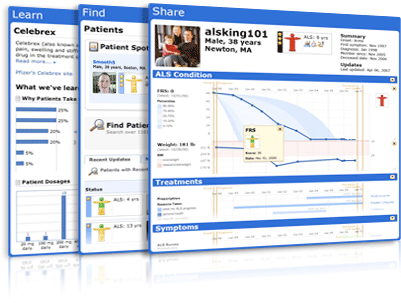Success of Health IT Depends on Cognitive Design
 As a cognitive designer using information technology (IT) to improve healthcare, I am always on the lookout for new applications that support or improve how clinicians, patients and family members think-and-feel.
As a cognitive designer using information technology (IT) to improve healthcare, I am always on the lookout for new applications that support or improve how clinicians, patients and family members think-and-feel.
One very interesting approach in the news is PatientsLikeMe. The site uses a social networking model to form online communities around specific conditions such as MS, Bipolar, Parkinson and HIV/AIDS. Members create detailed profiles of their history, condition and treatments that is freely shared with other members in the community. To make money the member’s data is packaged (with permission) and sold to insurance, medical device and pharmaceutical companies to support clinical trials and health studies.
Asking patients to participate in their electronic care so extensively, sharing health information so freely (PatientsLikeMe has an openess philosophy as well as privacy statement on their website) and then selling the data to “big brother” (insurance and drug companies) flies in the face of the traditional model that minimizes the role of the patient, locks health data in an electronic vault (privacy at all costs) and shuns selling it to vendors.
Patients help each other on a daily basis by providing information, advice, emotional support and even second opinions. The software provides each member a powerful visual history of their condition that clearly shows progress or decline.
The cognitive design of PatientsLikeMe is unique not only in the way it presents information but in the way it reshapes how patients think-and-feel about self care. It is a platform for creating patient practitioners with all the promise and risk that entails.
The site is getting traction. With 23,000 members it is growing 35% per month. They received a $5M round of venture financing and coverage in the national press. Some have expressed concern about the risks of getting medical advice from non-clinicians.
 Judging by the patient testimonials, and they are numerous, the founders appear to be achieving thier goal of improving the lives of people diagnosed with life-changing diseases by helping them share information. A major achievement to be sure.
Judging by the patient testimonials, and they are numerous, the founders appear to be achieving thier goal of improving the lives of people diagnosed with life-changing diseases by helping them share information. A major achievement to be sure.
Does the site improve outcomes and lower the cost of care?
I don’t know but I suspect it can. The question is worth studying because if we don’t get the cognitive design of such systems right they wont’ be effective and could actually cause harm. This is a pressing issue given the multi-billion dollar investment in Healthcare IT president elect Obama is calling for.
Unfortunately, issues in cognitive design – how clinicians, patients and family members really learn, make decisions, change behaviors and otherwise think and feel – take a back seat to the more pressing technical, legal and organizational issues that large-scale software implementation entails. This is ironic given the intellectual and emotional complexity of healthcare.
Healthcare is the very place where cognitive design should be a top priority.

December 20th, 2009 at 9:43 am
Very good site!
Is it ok to post a link to this site from mine? My blog is wp.assurancenetwork.net.
Thanks.
Jaime